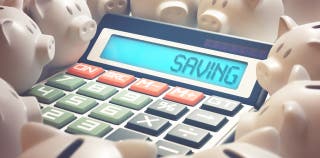How do I calculate my emergency fund amount?
How much you should have in your emergency fund will vary from person to person.
This will reflect your general monthly outgoings; the number of people, such as children or other unemployed family members, who rely on your income; and risks to your employment or health.
The following points will break down what you should consider when calculating your emergency fund amount.
Having your monthly outgoings, such as bills or bank statements, to hand will help you understand your monthly payments if you don’t already have an idea of what you spend.
Why do I need an emergency fund?
Reduce the likelihood of debt
With an emergency fund, you should be able to escape the pains and stresses of getting into debt. Without an emergency fund, you are far more likely to take out high-interest loans, borrow money from fellow family members or rack up debt on credit cards. The advantage of an emergency fund is the ability to replenish the funds in your own time and without the added problem of paying interest.
You are protected should you become unemployed
If you find yourself unexpectedly unemployed, an emergency fund allows you the freedom to cover any bills and expenses. Additionally, it also provides you with the rare opportunity to seek out a new role without rushing into the first job available just to pay the bills.
Protect against a failing business
Similarly to those who are employed by others, business owners or those who are self-employed often earn a living on the thinnest of margins. Having an emergency fund can protect you from the crushing surprise of having your business fail or a forced closure.
Face any unexpected tax burden
Tax season can bring with it the fear of being hit with a large tax bill. As the majority of tax debts have to be paid in a single payment, an emergency fund can protect you when the IRS comes calling.
How much money should I have in my emergency fund?
Although there is no set rule for the amount of money you should have in an emergency fund, experts recommend saving between three to six months in living expenses.
Don’t worry if you’re not sure of the exact number, as our emergency fund calculator can help you find a number that works for you and help you reach your end goal.
Don’t worry if you’re too busy to dedicate the time to calculate the exact number. You can start by simply saving a set amount of money from each paycheck, even if it’s something as little as $100 – making a start on saving is what’s important.
Where should I keep my emergency fund?
Knowing where to keep your emergency fund is key to its overall success.
You should strike a balance between accessibility and stability. It is inadvisable to keep your emergency fund in something as unstable as stocks or as inaccessible as your home value. On the other hand, keeping your emergency fund in a checking account is also not the best way forward, as accessibility will make it too easy to spend and difficult to keep track of.
Somewhere between easy access and stability is a savings account. This will allow you to have your emergency fund in a separate account from your regular spending money. The advantages of a high-yield savings account include the ability to increase your balance by high-interest rates and the overall safety net of not accidentally spending the money from this account.
How to start and build an emergency fund
-
Define your goals: Having a specific goal, however small, will provide the motivation and sticking power that will make your emergency fund a success. Begin with smaller, achievable goals, even if it’s something as simple as saving your first $100.
-
Make consistent contributions: Remember, an emergency fund is a marathon, not a sprint. This being said, it’s important to make regular and consistent contributions to your fund, no matter how small. The simplest way to do this is by setting up automatic recurring transfers. It may also be a specific amount of money you set aside day by day, month by month, or paycheck to paycheck. Keeping the figure consistent from month to month will create a regularity that will allow your emergency fund to grow.
-
Monitor your progress: Consistently monitoring your progress is a fantastic way of keeping you motivated and encouraging you to succeed. Something as simple as setting up an automatic notification every month will give you that little boost and an overall sense of achievement.
-
Celebrate your success: Don’t forget to celebrate your success! Recognizing your accomplishments and allowing yourself a financial treat every so often will keep you convinced of the emergency fund’s worth. A simple celebration after achieving your set goal will help you set higher and higher goals.
Emergency fund alternatives
We are all too aware that the mountain of a large emergency fund is a hard climb. Financial surprises can come out of nowhere and we often have to look for emergency fund alternatives.
Here is a quick list of alternatives if an emergency should arise.
-
Personal loan: A personal loan is usually categorized as a loan between $1,000 and $50,000 over a short period of time, such as two to five years. Those with a good credit history who can secure a personal loan with a rate less than 12% may find this an attractive option.
-
Home equity line of credit: A home equity line of credit, known as a HELOC, allows you to borrow money against the value of your home. Although your home is held as collateral, the rates can be as low as 2-3%, making it another appealing option for those in need of emergency funds.
-
Credit cards: Relying on credit cards may be an attractive option but they should be your absolute last resort. With high interest rates, using them as your emergency fund can heighten the likelihood of racking up uncomfortable debt.
You’ve viewed 3 of 3 articles
LOAD MORE




































